ABANYALA BA KAKAMEGA: The Indigenous Kitchen-Related Tools
The kitchen was a separate or semi-detached house that belonged to a woman. It was called esifumbiro because of the action of preserving fire by a process called okhufumbikha. However, the Kiswahili term echikoni has dominated it. At times, it was part of the main house for some few poor families. It was usually grass a thatched round house with mud walls and floor smeared with cowdung. A specific place was designated for chicken roosting in the same hut.
Men were desuaded from being fond of the activities in kichen every time. A man should never sleep in the kitchen since it is the place where a visiting mother in law would sleeps. Its door faced parallel to the main house's door. The main door among Abanyala faced Mumbo (West) or Ematioli (South).
In the kitchen of Omunyala, the following were common kitchen tools. Most of the items were sourced by the women. Gifts from mother-in-law to the daughter revolved around kitchen items and not bedroom items. The following were the major ones.
Men were desuaded from being fond of the activities in kichen every time. A man should never sleep in the kitchen since it is the place where a visiting mother in law would sleeps. Its door faced parallel to the main house's door. The main door among Abanyala faced Mumbo (West) or Ematioli (South).
In the kitchen of Omunyala, the following were common kitchen tools. Most of the items were sourced by the women. Gifts from mother-in-law to the daughter revolved around kitchen items and not bedroom items. The following were the major ones.
- Akhateng'e- small serving earthnenware for the husband. Used to serve the husband's last meal of the day called esikhonya mwasi.
- Akhatwetewe- pot like structure on wall or on floor for holding light reeds called emuli. Of recent past, they held a tin lap called totoba (corruption for touch-over due to way of puuting it off)
- Akhasoa- small basket for measuring cereals smaller than endubi but larger than akhayindikiri.
- Akhayindikiri- the smallest of all the baskets only larger than esibaba.
- Akhendo- special calabash for picking water or storing valuable items. Akhendo was also used to keep omukasa for the omwami and carry medicine. Akhendo was usually harvested by grandchild under instruction of grandparent. Proverb: Akhaliva akheendo, khamanyikhira khu likhuunja.

Akhendo - Amayika- cooking stone. Usually three with one movable one. Of the three stones, the first two, were searched and set in place by your mother in law. The first fire was lit by the wife using a mixture of her own firewood and mother in law's firewood. First meal was eaten by wife and your husband. Brothers and sisters were accepted pertaking this meal. The third cooking stone was fetched by the wife- it was a taboo for a man to unprocedurally throw away any of the cooking stones for it necesitated divorce. The three stones were symbolic of father, children and mother. Idiom: Okhusyula amayika- to divorce.
- Ebamo- fishing baskets. Always kept hung on the outside wall of the house. We had ebamo for male and that of females.
- Ehachi- earthen jug or jug curved from wood used for milking

Ehachi - Ekhaande- kitchen knife used for meat related cuttings.
- Embirambika (embirayika)- small stone that helps a pot to balance on cooking stone. This was searched by the wife. Riddle: Akhayama khamwasika akha; si khulilia ta? Answer: Embirambika
- Emuli- reed grass used as source of light. Proverb: Esiri ha ulafu bakhose nende emuli?
- Enchebe ekhasi- This was a small three legged stool without a skin on top for kitchen use by royal women vistors who found their way to the kitchen. Children sat on the floor.
- Endayi- basket woven in the shape of a pot to store precious items.
- Engacha- headpad. Used to help balancing a pot or firewood on the head and make carrying comfortable. It whas made from straps of banana stem bark. Also those made from fibre of cLimbers called olusianyama were use for stablizing calabashed during serving of porridge. That from banana fibre is never used to stabilize a beer pot during a function. When a woman delivered a baby girl, it was put at the door to symbolize the girl child. No vistor was to ask the gender- the engacha spoke it all.

Engacha - Enungiro eya amachuku (not eningiro)- cooking pot with side handles for cooking. The handles resembled air potatoes hence the name amachuku or eseebe. They were of various types

Enungiro ya amachuku - Enungiro eya esitekho- cooking pot without side handles for cooking given to a wife, upon being commissioned to start cooking, by her biological mother and kept on the omusereswa. It was decorated once across the body and a over strong prominent rim without handles (amachuku). It was a taboo for a man to break this pot and had to pay for it.

Enungiro eya esitekho - Enungiro eya lukakha- pot for cooking ugali, omwoka (mashed cassava), bananas and omukhenye- mashed potatoes. It had a slightly wider mouth to anable the cooking stick to move with ease. It had both amachuku (ear-like handled) and olunika (strong rim)

Enungiro eya lukakha - Enungiro eya mbeba- pot for cooking vegetable or other cereals or tubers. Proverb: Eyalunga namasaka (eya mbeba) siwangamo owuluho (smell from namasaka)
- Enungiro eya munyu- pot for cooking meat or chicken. It had a wider mouth. This pot was associated with the male.
- Enungo- firewood store. Holes were dug by the man. Pillars of omulondang'ombe tree put in place by the man. However, putting of firewood on it done by the wife. It also acted as store for other items such as seeds, mushroom etc. Proverb: Mbo omukutu siakeraka enungo? Proverb- Wuli khakhaye nende enumgo yakho.
- Enyungu ya ebasa- pot with two openings on a single body used during twin dance, leadership coronation and rainmaking dance. It was made smooth and occassionally oiled.

Enyungu ya ebasa - Enyungu ya embanga- a big pot with a wide mouth used for brewing lagrge quanties of brew during circumcision, marriages and funeral rites. It was so big that it could not be carried by one person.
- Enyungu ya esibende- narrow and a very long narrow mouth pot used to during rain making ceremony to carry waterw.

Enyungu ya esibende - Enyungu ya esachi- A big pot for storing grain. At times used to store brew before it is distrubuted into the pot for sipping with esekhe.
- Enyungu ya olukiyo/ enjengekho- pot in which main cooked beer is kept during drinking. Beer from embanga is transfered into it to act as the drinking pot. Straws are put in it. It mouth had no prominent rind or rim. It was put at the drinking place by a morally upright woman. It was put on esichinbi and not engacha during beer drinking. Breaking this pot when the beer in it was a taboo- it has lead to calamities to many policemen and leader who break it to stop beer drinking.

Olukiyo or enjengekho. - Enyungu emumiro- pot for storing milk for making butter fat (emuma). It had narrow bottom and wide mouth area to anable the cream to rise and be easily collected. It was smeared with butter milk during curing and painted using special colour called omutoba.

Emumiro - Esanda- big calabash without a handle that acted as general temporal container for small household items.

Esanda with ebitawulo. - Esekhe- drinking straws. The sieve on the drinking straw end was called esikooto.
- Esibange- earthen dish plate. Smaller than olukaye. Proverb: Omukeni muwuyi; ochamwachira esibaange.

Esibaange (two big ones) and ebiocha - Esibaba- a small woven tray-like structure, the size of a palm, used to measure the auantity of small seeds such as crotolaria and amaranthus.
- Esibabi- knife sheath. A knife sheath made of dry cattle skin used to store a knife forsheath safety purposes.
- Esibecho- temporary ash store and temporary oven area for cooked meal. It also acted as main place for roasting meat
- Esichibi- resting platform for a pot or a movable pot stand on which beer pot is rested.
- Esichuchungo (esiocheresio- a sieve made from a calabash or curved wood

Esichuchungo - Esieyo- kitchen broom. Made from specific grass species called owukusinde.

Esieyo - Esihaango- special stick or wire for meat roasting. Placed above esibecho.
- Esihani- stick well made for hunging on house items. Also used for piece of string.
- Esikaye- pot for carrying porridge or carrying brew from one point to another. It had a wide by area. It is never used to cook. At times it is also used for fermenting small amount of porridge or mixture of flour and warter called esinoho.

Esikaye - Esikho- medium sized cooking stick that is slightly larger than olunikho but smaller than omwikho.

Esikho - Esikhokoro- a matalic object used to remove wet caked ugali remains from the cooking pot.
- Esikolonjio- portion of broken pot used to fetch fire.
- Esikhwabi- a small pot or gourd with a pipe used by worriors to smoke bhang via concoction made from canabis sativa. Commonly used by warriors as they prepared to go to war. The bhang so smoked was called enasoli. The vegetable used was also made from same plant. The expert in making enasoli was called omunasoli.
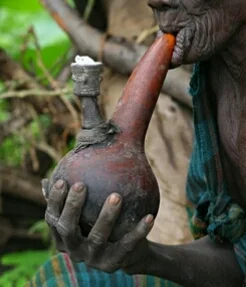
Esikhwabi - Esikwakwata. It was a fennel made from a gourd by cutting the botton off and leaving the stalk hollow. Esipeki- small cup container for measuring chang'aa
- Esikwata- a small cup-like item with a handle made from a gourd for drinking liquids in small amounts.
- Esimuka- gourd for storing milk, omuunyu mufume
- Esimwelo- woven basket: we had esibaba, akhasoa, esitubi and esyindikiri. Proverb: Okwa nga esimwelo (esitubi); ochakwa nga esoongo.

Esimwelo - Esinaka- the head of an earthen smoking pipe. It was common with old women who smoked dried tobacco leaves. Smoke from it was used to make newborn babies breath.

Esinaka or Okunaka - Esipoliko- any cylindrical containers for storage
- Esisaho- a big gourd for storing seeds or milk. It mouth area was slightly wider than the neck.

Esimuka - Esisala- specially woven sticks for sitting on in the kichen.
- Esisabo- a wide calabash with a strong cylindrical handle used in washing hands before having a meal

Esisabo - Esisabio- a big callabash for holding water for washing babies.

Esisabio - Esisanda- small platesize callabashes for drinking water or eating porridge

Esisanda (open handle) on its engacha - Esiukutwa- lid for a guard made from cork or maizecob.
- Esitandaliro- a wooden raised structure for storing kitchenware after washing or milk gourds.
- Esitawulo- smallest form of callabashes made from very small gourds used for scooping small amounts of liauids-such as eating soaked amakhalange from main calabash. It was equivalent to the modern varieties of spoons. The depression made tiwards the tip of a lump of ugali bears the same name since it was same in structure. It served brew to lactating mothers to stop afterbirth pain.

Esitaulo - Esitendekere- an old basket from esimwelo used as nest for chicken.
- Esiteru- woven plate. Made using sticks from oluluundu. It was never smeared.
- Esiting'iro- a woven netlike structure used in squezzing brew
- Esitubi- small basket smaller than esimwelo but larger than akhasoha.
- Esibecho- temporary ashstore that extended back from the fireplace. It was also the meat roasting place and traditional oven site.
- Esiwiri- pistle and motor. The pestle is called omuwuchiro.
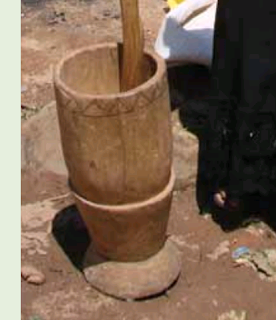
Esiwiri - Esiyindikiri- a small basket that is not smeared with cowdung with holes.
- Esiyonjo- quil basket.
- Esongo esaakha- a big strong low pot for storing water. It can take more than ten normal water pots. Also used for brewing beer for inougration of omwami.

Esongo esakha - Esoongo yo oluleemo- long wide mouthed pot for fetching water. Some were big for domestic internal kitchen use. Proverb: Esoongo yatikhiranga ha amuliango.

Esongo ya olulemo - Esoongo- pot for storing water

Esongo - Ewuli- storing chicken. At least two chicken were put in it up to noon (visitors can come)
- Eyambo- reeds or papyrus mat used to partition the kichen.
- Okusaho- a big gourd for storing liquids such as milk (No wonder an assortment of drinks is known as ebisawo.)
- Olucho- roasting pan or pan for cooking ugali, potatoes, arrow roots and cassavas. Proverb:. Omuloongi yesi aliranga khu luchio. That even the potter may eat from the main pot for lack of utencil yet he is the one who makes them.
- Olukaye- bigger serving plate made of clay.
- Olukhalangiro- an extreamly wide mouthed pot for preparing malkhalange (farmented and roased flour doughs) for cooking brew.
- Olukherekho- small double stomach pot with spout at the bottom and a perforated middle used to make omukherekha. A big one used to filter ash in the making of omunyu mu fume was falled esikhenulo. Idiom: Okhukherekha omuntu- to trap by bewitching

Olukherekho - Olukina and esio- mother grinding stone and its small stone. Proverb: Owukula olukina awukula nende esio yosi.

Olukina and esio - Olukirau lukhasi- very small guard for storing spices.
- Olunikho- small cooking stick with spoonlike depression called olunika used for serving vegetable or cooking child's porridge.

Olunikho - Olusalakiro- a woon wheel-like structure with unique patterns ridges used by potters to draw ppatters on the shoulder and body of a pot. Each potter marked all the pots uniquely.
- Oluteru- woven tray used for winnowing grain.
- Olusanja- it is special bed made for mothers who had given birth.
- Olwero- feeding trough for chicken or other domestic animals made from curved wood or woven sticks. At times, many people could have boiled potatoes, cassavas of bananas put on it.

Olwero lubaache - Olweyo- special out of house broom made from twigs of a shrub called ameyo.
- Omubano- knife
- Omukuba- in homesteads of chiefs where a lot of cooking was needed. It bellowed the fire.
- Omunyu mufume- salt made from reeds' ash filtrate
- Omuunchinchi- sweeteners such as sugar, honey, onjiwo, ekore etc.
- Omuranda 'specially designed reed mats for sitting or making the base of sleeping material.
- Omusa/esitiyo- a spade like small metal used for carrying 'borrowed' fire, undigging sweet potatoes (amabwoni makonaanjie), roasting amakhalaange and removing amalolondo.
- Omusekese- a log from flame tree used for igniting fire using a stick. It was the traditional matchstick.
- Omusereswa- pot's store made from netlike ropes to hung under roof. Proverb: Omusereswa kwisungwacha kwereecha. (Let it swing, do not go for it, it will come)
- Omuyinda- a big basket used for keeping cereals in the house. At times it was used to keep in chicken at night. The one for ckicken had one side (front) that was lower than the other. Unlike the cereal baskets, it was not smeared with cowdung. Proverb: Omuyinda kwicha engokho ba behera omufunikhi.

Omuyinda.





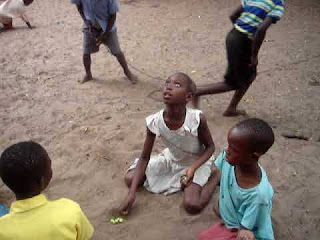
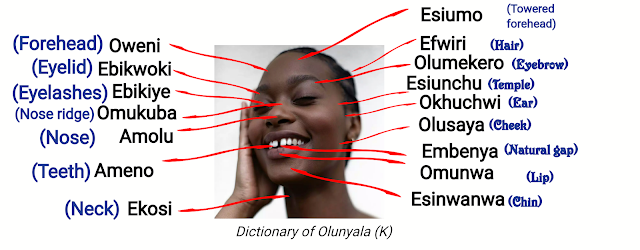
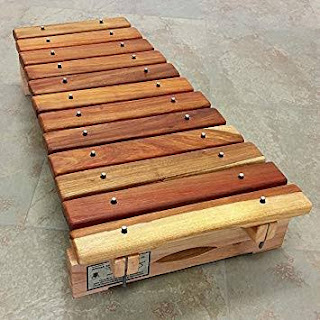
Comments
Post a Comment